Want to know what is SEO and everything about it, then this article is just the thing for you.
Search engine optimization (SEO) is vital for improving your website’s visibility on different search engines.
So, to understand SEO, ensure to read this article till the end. It explains what is SEO, how it functions, and more.
Let’s start!
What is SEO, and Why is it Important?
SEO, a short form for search engine optimization, is the combination of the words “search engine” and “optimization.”
A search engine is a system software that crawls web pages and provides users with the most relevant results.
Google, Yahoo, Bing, Yandex, etc., are some of the popular search engines.

Optimization involves making improvements and fine-tuning something to meet specific requirements.
Thus, search engine optimization is the process of improvising your website so that search engines can easily find it.

This enables your website to appear higher in the search results.
Why is SEO Important?
Search engines are the major source of traffic for most websites, even though paid ads and social media also bring in traffic.
Unlike paid traffic, organic traffic refers to the visits generated from search engines without incurring any cost.
Thus, search engine optimization is the most effective approach to boosting organic traffic.
Further, SEO is important for several reasons as follows:
1. Improved Traffic
SEO enhances the visibility of your site and improves its ranking, thereby driving more traffic.
2. Better Credibility and Trust
Users often perceive that the websites ranking higher offer quality content and are more trustworthy.
Thus, SEO is important to boost your site’s ranking, gain authority, and earn your users’ trust.
3. Cost-effective Marketing Strategy
As mentioned earlier, search engine optimization helps you generate organic traffic; the traffic generated without incurring any cost.
It means that SEO is a cost-effective marketing strategy, unlike paid advertisements requiring payment.
4. Better User Experience
SEO practices also involve optimizing site speed, responsiveness, quality content, and more for user engagement.
Hence, it helps to improve the overall user experience of your website.
How does SEO Work?
Next, in our article on what is SEO, it’s time to learn how SEO works.
There are three components involved in search engines.
- Crawlers (Spiders or Bots): Search engine uses crawlers (spiders or bots) to crawl your website and gather information by scanning web pages.
- Index: The content on the pages helps the crawler to understand what each page is about. Then, it stores the information in its huge database of web pages called an index.
- Algorithms: When the users enter their queries, search engines use algorithms to pull the most relevant search results for the query.
The complex algorithms of search engines consider several ranking factors to show your page in search results.
These ranking factors incorporate a combination of on-page, off-page, technical, and local best SEO practices.
Thus, SEO works through a combination of on-page, off-page, technical, and local optimization techniques.
Now, let’s discuss them in detail in the next section.
Key Components of SEO
A. On-page SEO
On-page SEO or on-site SEO refers to optimizing different elements on your website to get more search engine traffic.
It includes optimizing keywords, titles, meta descriptions, URLs, etc.
1. Keyword Optimization
A keyword is a specific term or group of terms that you utilize in your content for ranking higher in search results.
You must distribute the keywords naturally and strategically throughout your content. Also, it’s essential to avoid the practice of keyword stuffing.
2. Optimizing Title and Meta Description
Titles are your users’ first read before heading to your main content. So, it’s necessary to make your title catchy to grab users’ attention.
Likewise, meta descriptions are like a trailer for your whole content. It helps users to understand what they can expect from your content.
Writing a compelling meta description can help visitors persuade to click on your content.
3. Permalink Structure
URLs or permalinks of your site help search engines and users understand your site’s context. So, it’s necessary to set up an SEO-friendly permalink.
Your permalinks should be simple and descriptive with relevant keywords added to them.
4. Content Optimization
Optimizing your content is vital to building trust and enhancing your site’s authority. Thus, ensure to provide fresh and quality content and update it regularly.
5. Internal and External Linking
The use of internal and external links improves the credibility of your site. Further, it helps search engines crawl your site and enhance site traffic.
B. Off-page SEO
Off-page SEO or off-site SEO includes the activities performed outside your website to get exposure and improve its ranking.
It includes building backlinks, social media marketing, guest posting, etc.
1. Link Building (Backlinks)
If third-party websites use links that point to your website, it means you’ve got a backlink from that website.
The higher the number of high-quality sites linking to your website, the higher your site’s authority and ranking opportunities.
Therefore, you should make efforts to build quality backlinks.
2. Social Media Marketing
Social media platforms do not impact search engine rankings. However, they do assist in increasing the visibility of your content and attracting more visitors to your website.

A strong social media presence is essential for effectively marketing your products/services to a diverse audience. It also helps you reach your desired audience.
Additionally, it allows you to advertise your brand, which brings more visitors to your website.
3. Guest Posting
Participating in guest posting allows you to introduce your brand to a fresh audience, potentially leading to increased brand mentions.
Furthermore, it can be an effective strategy for building valuable backlinks to your website.
C. Technical SEO
Technical SEO improves a website’s technical aspects to enable search engines to crawl and index your site more effectively.
Technical SEO optimization includes improving the site’s speed, adding XML sitemaps, structured data markups, etc.
1. Improving the Speed of Your Site
The speed of your website is a crucial element that search engines consider for ranking your site.
Therefore, optimizing your site for blazing-fast performance is essential.
For this, you can utilize Content Delivery Networks (CDNs), minify HTML, CSS, and JavaScript files, and implement other techniques.
2. Create XML Sitemap
XML (Extensible Markup Language) lists your website’s URLs that act as a roadmap for search engines to crawl your site smoothly. It helps to index your site better and improve your ranking.
SEO plugins like Yoast SEO enable you to create XML sitemap effortlessly.
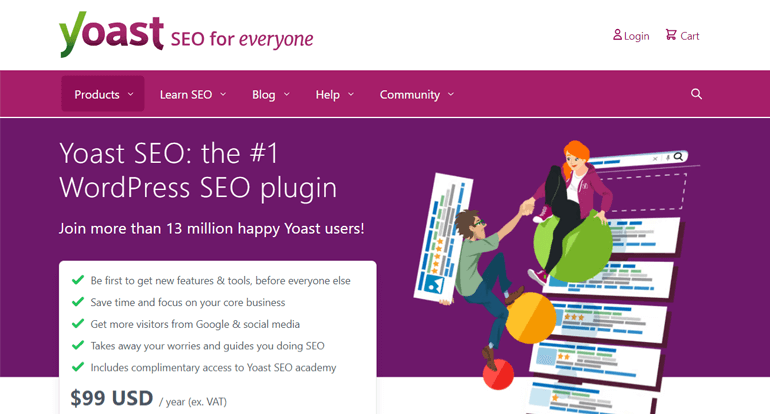
3. Implement Structured Data Markup
Implementing structured data markup lets search engines understand the context of your site better.
Applying structured data markup is just a walk in the park with the plugins like Rank Math, All in One SEO, etc.
4. URL Canonicalization
URL canonicalization refers to specifying the preferred URL in case multiple URLs point to the same content on your website.
Search engines like Google tend to index the canonical URL in such cases.
To add canonical tags to your HTML, include the rel=”canonical” attribute within the <head> section of your page’s HTML code.
For instance, <link rel=”canonical” href=”https://www.example.com/page”>
D. Local SEO
Local SEO optimizes your site to improve its visibility in local search results.
It brings many advantages to online businesses with physical stores or companies that serve a specific area.
For any local searches, Google shows up with two types of search results local pack and organic search results.
Organic search results are just the normal search results we see on Google. On the other hand, a local pack (map pack) is a local business listing along with a map.
For instance, typing best burger house near me in the Google search instantly shows you the lists of locations near you.
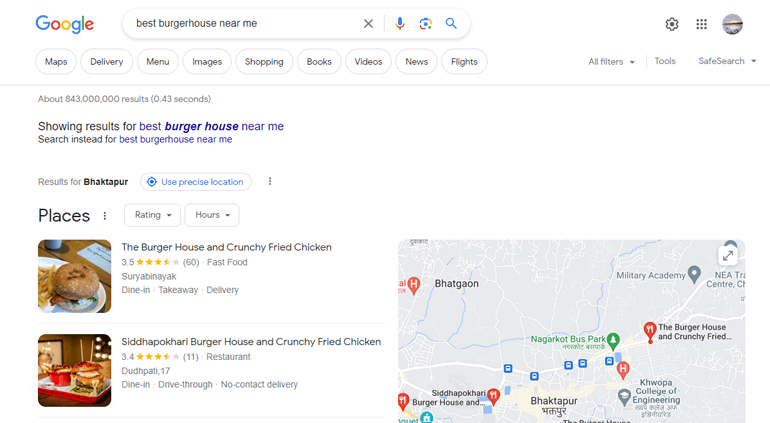
Local SEO can effectively place your website in front of people close to your area.
So, to implement local SEO effectively for your business, research your competitors to collect ideas and do local keyword research.
Besides, you need a Google Business profile, meaning you should create your Google My Business Listing.
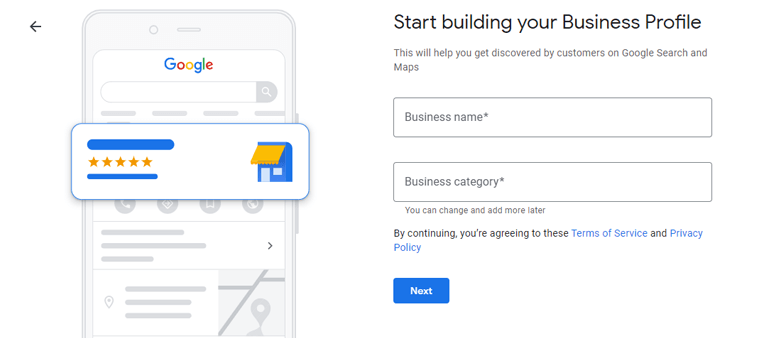
It’s a free business listing where you can add up-to-date information regarding your business. It’s a must for a local SEO, indeed.
Further, ensure that your website, social media, profiles, directories, citations, etc. have correct NAP (Name, Address, and Phone number) information.
This is important as Google tends to verify that the business information that you’ve provided is true.
Best SEO Practices
Here are some essential SEO practices that every website owner must implement for a better ranking.
1. Keyword Research
The quantity of website traffic largely depends upon the type of keywords you choose.
Thus, it’s necessary to conduct keyword research to identify the search terms that people enter to find the answer to their queries.
Optimizing your content around such keywords helps you to attract more traffic to your website.
2. Provide Quality Content
There’s a common saying that Content is King. It’s because high-quality content is a foundation for engaging users and fostering positive user experience.

Delivering valuable content solves problems and fulfills the queries of the users. Thus, it improves the ranking of your website and drives organic traffic.
Further, well-researched and informative content helps build your site’s authority and credibility.
3. Optimizing Images
Images are important to break the text and make your content visually appealing. It’s also vital for improved comprehension.
However, only adding images won’t suffice; you must also optimize them to contribute to the overall SEO efforts.
You should choose from the proper image formats like JPG, PNG, etc.
Besides, you must compress images to minimize page size and enhance your site’s speed.
You can find several image optimization plugins to compress the images.
Further, you can optimize images with alt text, titles, and captions to make them SEO-friendly.
4. Link Building
Backlink is one of the important factors that Google accounts to determine the quality of your content.
More the reputable website links to your site, the higher your website’s credibility and authority.
Therefore, you need to make efforts for backlink building.
5. Google Analytics Integration
Integrating Google Analytics provides you with detailed insight into your website’s performance. It tracks important metrics like your site traffic, user behavior, conversion rates, bounce rates, etc.
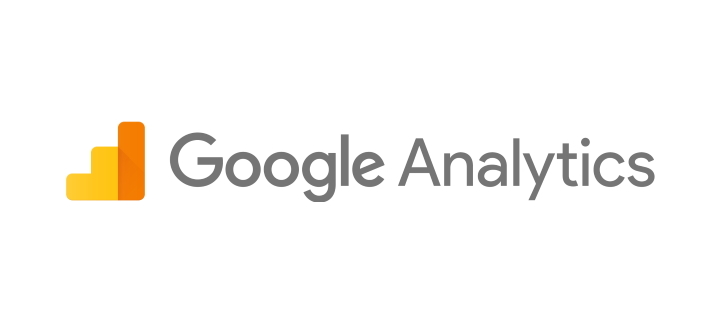
Thus, these data allow you to evaluate the effectiveness of your marketing campaigns. Further, it helps to identify areas for improvement plus make informed decisions to optimize your site’s performance.
6. Performing SEO Audit of Your Site
SEO auditing keeps you updated about your overall site’s health. It helps you identify strengths, weaknesses, and areas for improvement within your site’s SEO strategy.
This knowledge allows you to develop a targeted action plan to enhance your site’s visibility and organic traffic.
The best part is you can find several online tools that will help you to audit the SEO of your site.
Some handy SEO auditing tools are SEMrush, Google Analytics, etc.
7. Make Your Website Mobile-friendly
These days more than half of the website traffic is from mobile devices. Hence, you need to ensure to optimize your site for mobile devices.
The good news is if you are a WordPress user, you’ll find many options for responsive themes. A responsive theme helps your site adapt perfectly to any screen size and type.
Furthermore, you’ll also find several AMP plugins to help your site make mobile pages ready.
8. Frequent Content Updates
Keeping your content up-to-date with fresh and relevant content brings numerous benefits. For instance, it engages your users and improves search engine rankings.
Besides, it also has a pivotal role in establishing your site’s authority and staying ahead of your competitors.
Note: Refer to this comprehensive guide to explore additional SEO practices to implement on your site.
Some Important SEO Tools
Now, it’s time to learn some of the must-have SEO tools for your site. So, let’s dive in.
1. Rank Math
Rank Math is a popular WordPress SEO plugin that enables you to optimize your WordPress website for search engines.
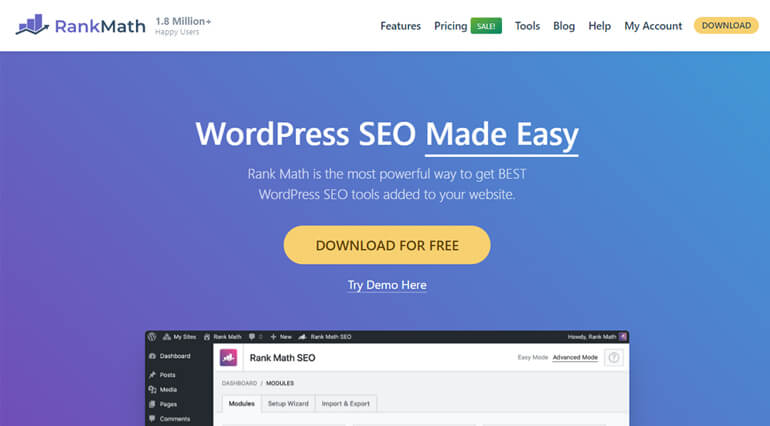
Whether you’re a beginner or an expert, Rank Math empowers you to customize essential SEO settings without breaking a sweat.
It offers SEO features like keyword optimization, advanced schema generator, SEO analytics, etc. Further, its Content AI helps you write SEO-friendly content.
Key Features of Rank Math
- Easy-to-follow configuration wizard
- Keyword comparison and Google Trends tools
- Integrated with Google Analytics 4
- Track your website performance with Rank Tracker
- XML Sitemap
2. SEMrush
SEMrush is a comprehensive SEO tool perfect for businesses, bloggers, and digital marketers to grow organic traffic.
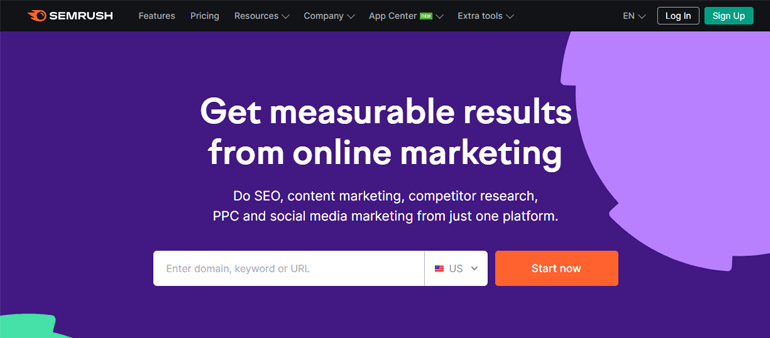
It enables you to do in-depth keyword research and competitive analysis, track your site’s ranking and do much more.
Besides, SEMrush also facilitates you with backlink building tools, backlink analytics, SEO auditing, local SEO, and so on. Thus, it helps you to enhance your overall online marketing strategy.
Key Features of SEMrush
- Provides valuable insight on keyword difficulty and search volume
- SEO Writing Assistant Tool for SEO-friendly content
- Social media monitoring
- Social content template
- Allows topic research
3. Ahrefs
Ahrefs is an all-in-one SEO toolset and a great alternative to SEMrush. This tool is vital in improving website visibility, analyzing competitors, and optimizing online strategies.

Although it offers several features that overlap with SEMrush, it particularly excels in backlinks.
It enables you to take insight into the backlink profiles of websites, thereby enabling you to understand the link-building landscape.
This encourages you to develop effective strategies to improve your search engine ranking.
Key Features of Ahrefs
- Comprehensive keyword research tool
- Advanced SEO metrics
- In-depth competitor analysis
- Rank Tracker to track the ranking progress
- SEO audit to find out your site’s technical and on-page SEO issues
4. Google Search Console
Google Search Console, a free web service by Google, enables you to improve your site’s performance on Google Search.
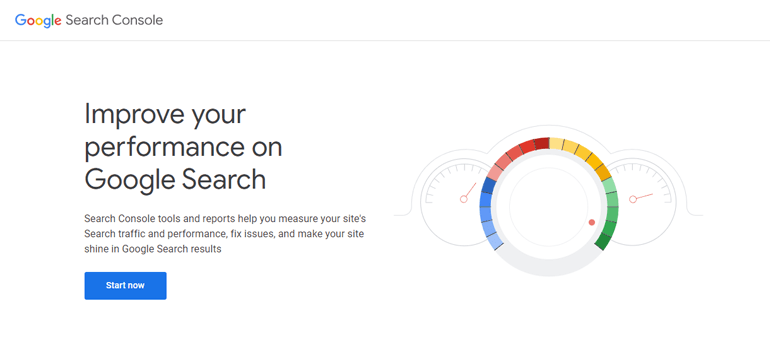
This convenient tool helps you understand how Google sees your site. It also makes you aware of the issues affecting your site’s performance and helps fix them.
Moreover, it helps you analyze your site’s impressions, clicks, and position on Google Search.
Key Features of Google Search Console
- Submit your website’s sitemap for better crawling and indexing
- Search Console tools to monitor, test, and track AMP pages
- Allows you to test and improve your site’s mobile usability
- Helps you uncover the rich result entities that Google has detected on your site
- Detects security issues and help fix them
5. SpyFu
SpyFu is a comprehensive SEO tool for WordPress. It allows you to conduct keyword research, competitive analysis, backlink outreach, PPC (Pay-per-click) analysis, and more.
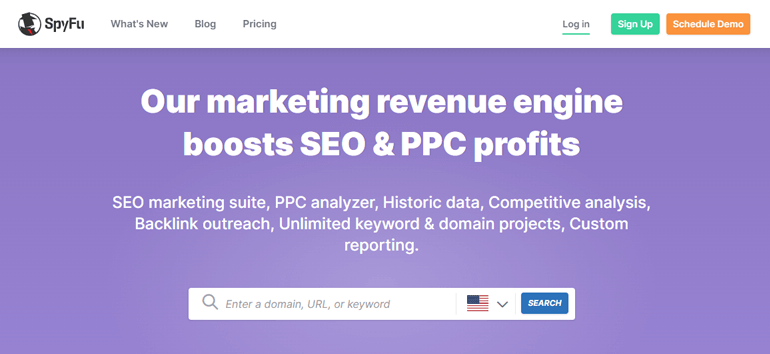
You can also enter the competitor’s domain to obtain complete information about their organic search rankings, paid search campaigns, and ads.
Thus, you can uncover competitors’ top-performing keywords, ad strategies, PPC campaigns, and more to stay ahead.
Key Features of SpyFu
- Research competitors’ SEO keywords
- Track your keyword ranking
- Monitor PPC competitors
- Quality backlinks recommendation for specific keywords
- Social outreach for backlinks
6. Screaming Frog
Screaming Frog is a widely used tool that audits your website to improve your site’s SEO.

It crawls through the pages of your website. Thus, it identifies issues like broken links, server errors, and any technical errors to help you fix them swiftly.
Furthermore, it analyzes page titles and metadata, to identify if it’s too long, short, or duplicated across your site.
Key Features of Screaming Frog
- Quickly generate XML sitemap and image sitemap
- Discover exact duplicate content
- Schedule site audit
- Custom Robot.txt
- Google Analytics and Google Search Console integration
SEO Trend and Future
SEO is a crucial element for any website to rank in search engines. Thus, it’s essential to implement the best SEO practices to safeguard a higher position of your website in the SERPs.
However, based on the latest technology and user demand, search engine algorithms also keep evolving. Because it aims to deliver more accurate and quality search results to its users.
Thus, SEO trends also keep changing with the change in search engine algorithms.
It means SEO trends are dynamic. So, we need to keep up with the pace of these continuously evolving SEO trends to stay ahead of the competition.
With that said, let’s take an insight into future SEO trends that we can anticipate in the near future.
1. Voice Search
With the booming popularity of voice assistants, voice-based searches are becoming more prevalent these days.

Further, voice searches have hand-free interactions and are more convenient. Due to this reason, we expect voice search to become an important SEO component soon.
Voice searches are more conversational and longer than keyword searches. Therefore, businesses and website owners must optimize their content for more natural language and long-tail keywords.
2. Video Content
We can see that video content is growing rapidly in the online market. It’s because people prefer to gain knowledge and information through videos rather than reading pieces of information nowadays.
As per the latest reports, YouTube has over 2 billion users worldwide. It means there’s a tied competition to rank for your video content as well.
Therefore, you must optimize your video content to increase its visibility on SERPs.
For this, you can use YouTube’s autocomplete feature to find the trending keywords that people are recently searching on YouTube.
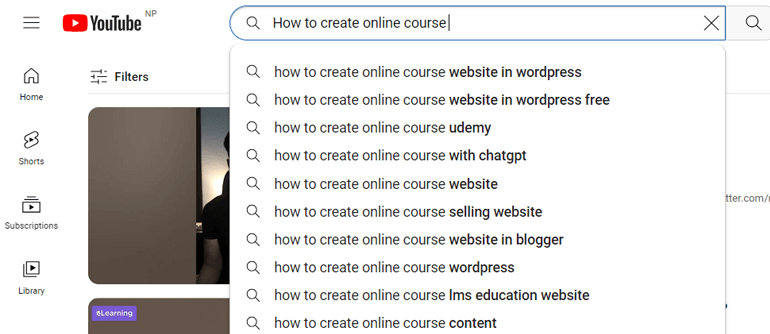
Then, you can optimize your video around that keyword. Besides, you can even add them to your video’s title, tag, and description to rank for them.
3. E-E-A-T (Experience, Expertise, Authority, Trustworthiness)
The E-E-A-T stands for Experience, Expertise, Authority, and Trustworthiness. These are the essential elements that Google considers to determine your website’s accuracy and reliability.
Thus, any website must demonstrate these four traits to earn its position on top of SERPs.
Here are a few suggestions you can implement in your content to enhance E-E-A-T.
- Deliver high-quality and thoroughly researched content
- Keep your content up-to-date
- Ensure to link reputable websites and reliable sources
- Build high-quality backlinks
- Add more positive reviews on your site by encouraging satisfied customers to share their feedback
4. Artificial Intelligence (AI) and Machine Learning
With the ongoing advancements in AI and machine learning, their significance in SEO will grow more in the coming days.
For example, Google introduced its AI algorithm, RankBrain, in 2015. Now, it’s an important component for ranking in search engines.
RankBrain uses machine-learning techniques to understand the search queries from users. And it filters out the most useful and accurate search results.
Google’s AI algorithm considers several factors, including page relevancy, user experiences, backlinks, etc., to determine the search engine rankings. Therefore, you need to optimize your content for these factors.
5. Core Web Vitals
Core Web Vitals is one of the latest ranking factors introduced by Google in 2020. It’s a metric that measures the user experience while they visit your site.
For this, Google considers page loading speed, ease of interaction, and visual stability.
Besides, Google also considers mobile-friendliness, HTTPS, safe browsing, etc., to determine the overall page experience of your site.
However, the components like speed, interaction, and visual stability contribute to a large part of the score compared to other factors.
Thus, it’s essential to watch your core web vitals to achieve a higher ranking for your site.
Three main metrics are included in core web vitals to improve and optimize your website for ranking. They are:
I. Largest Contentful Paint (LCP): It measures loading performance.
II. First Input Delay (FID): It measures interaction.
III. Cumulative Layout Shift (CLS): It measures visual stability.
Besides, the SEO trends like mobile friendliness, quality content, local SEO, and backlink building will also remain relevant in the future.
Therefore, incorporate these practices into your content to enhance your chances of ranking higher.
SEO Monitoring and Analytics
Just implementing SEO campaigns won’t suffice. You should also monitor your site’s SEO performance for improved website visibility and more organic traffic.
SEO monitoring enables you to get insight into important site metrics like on-page SEO, page speed, bounce rate, and more.
So, for SEO monitoring, you must first integrate Google Analytics into your website. So, sign up for Google Analytics first, then add the tracking code to your website.
Google Analytics integration helps you monitor the traffic flow to your website. It also enables you to track the number of visitors, the average session, the bounce rate, etc.

It also provides data on page speed and helps you track conversions and sources of traffic to your website.
Further, it also offers demographic data of users and their behavior on your site.
Thus, all these Google Analytics reports allow you to analyze the effectiveness of your SEO strategies and identify improvement areas.
You can also use MonsterInsights, a complete Google Analytics plugin, to monitor your site’s SEO and get detailed analytics.
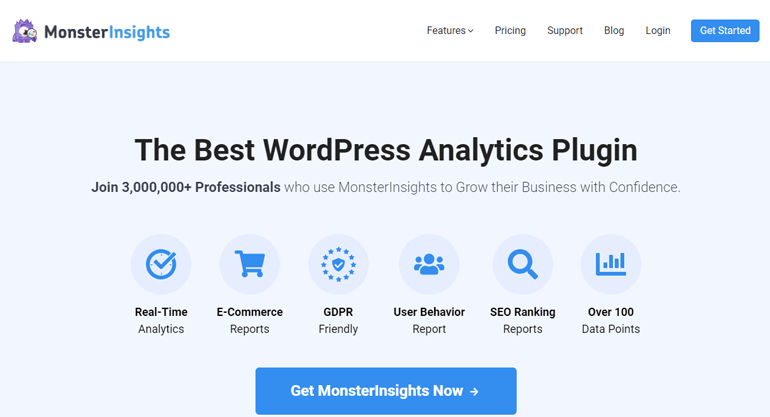
Besides you can also sign up for Google Search Console for free. It enables you to optimize your content with useful analytics like site impressions and clicks.
It also alerts you regarding any issues on your site. Thus, you can fix them asap. Likewise, you can also submit XML sitemaps and review your site’s indexing on Google.
Furthermore, you can use tools like SEMrush, Ahrefs, and Moz to find important keywords, track rankings, and analyze competition.
Besides, SEMrush and Ahrefs can also allow you to analyze your site’s backlink profile. Hence, you can easily track new backlinks and recognize the potentially harmful links.
Role of AI for SEO
AI plays an important role in search engine optimization, as it impacts various aspects of SEO strategy, as discussed below.
1. Conducting Keyword Research
Several AI-powered keyword generator tools can assist you in conducting keyword research. Some of these tools include ChatGPT, Twinword, CopyAI, etc.

These AI-based tools use algorithms to analyze search trends and competition. Thus, it helps to generate relevant keywords with higher chances of ranking in search engines.
Simply input the primary keyword, and these tools will generate extensive lists of keywords.
2. Content Optimization
AI can also help you to optimize your content for enhanced visibility in search engines. By analyzing your content, AI algorithms offer valuable suggestions to better structure your content and improve its quality.
AI-powered content-creation tools like Jasper AI, CopyAI, and ChatGPT even help you by generating high-quality content.
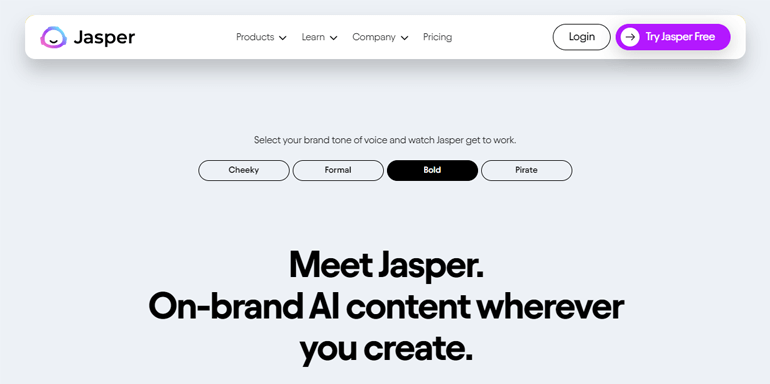
Additionally, these AI tools suggest internal links and help optimize meta tags for better content SEO.
3. Link Building
Artificial intelligence technology also helps identify high-quality backlink opportunities with less effort.
LinkHunter, Link Whisper, and Postaga are some of the best AI-based link-building tools of all time.

4. Technical SEO
AI tools like Botify, DeepCrawl, Ryte, etc., can automate various technical aspects of your site.
For instance, some AI tools help you generate XML sitemap. Thus, simplifying your task and saving your precious time.
Further, they also help implement structured data markup to provide additional website information to search engines.
Besides, they also assist in identifying technical issues broken links, slow page speed, mobile-friendliness, and other issues.
Thus, these valuable insights can help you quickly optimize the technical aspects of your site.
5. Search Engine Algorithms
As we’ve discussed previously, Google uses an AI algorithm such as RankBrain to understand the user’s search intent.
It examines user behavior and website experience to improve search results. It also evaluates the quality and relevance of the website.
Thus, AI algorithms greatly impact the ranking of your website on search engines.
6. Voice Search Optimization
We all know how popular voice assistants like Siri, Alexa, and Cortana are these days. That makes it crucial to optimize your content for voice search queries.
AI-powered tools apply Natural Language Processing (NLP) algorithms to understand voice search queries accurately.
Thus, these tools allow for better content optimization for natural language queries.
Further AI-powered tools assist in identifying voice search keywords and even help in generating voice queries friendly content. Thereby enabling your websites to rank better in voice search results.
7. Data Analysis and Reporting
Above all, you can also use AI-powered tools to analyze data from different sources like search engines, web analytics, etc.
Hence, they provide actionable insight for website owners and digital marketers to make data-driven decisions for refining their SEO performance.
How to Learn SEO?
To learn SEO, start with the basics and remember that it takes time and practice to improve.
So, here are some steps you can follow to learn SEO and become an expert at optimizing your website.
1. Use Official Google Sources to Get Information
You don’t need to get too far to gain information on SEO. Google itself inhabits valuable resources to help you get essential knowledge on SEO.
Google search central has an SEO starter guide covering SEO basics.
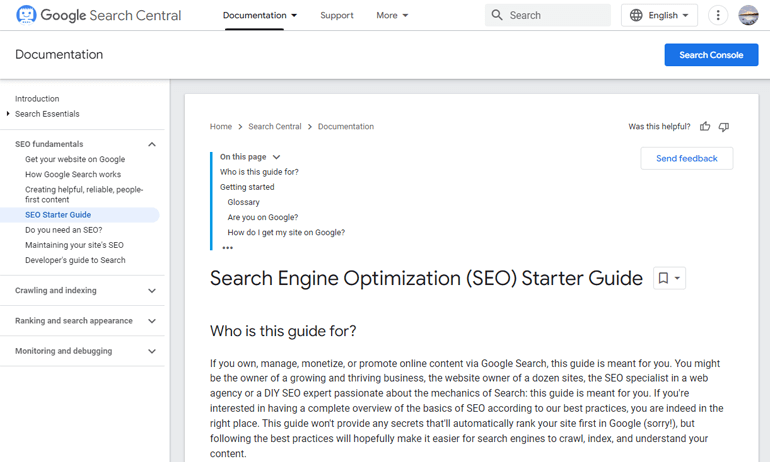
Likewise, Google search essentials cover topics like technical requirements, spam policies, and key best practices. Thus, this guide enables you to enhance your site’s visibility on Google search results.
Google’s guidelines for search quality evaluators help SEO practitioners understand how Google assesses search result quality.
2. Read SEO Blogs
Apart from Google’s resources, you’ll find several other blog websites offering valuable and informative content on SEO.
A good example is the ThemeGrill blog itself. It has several contents for improving SEO on WordPress, Keyword research tools, WordPress SEO plugins, and more for your help.

Additionally, you’ll find quality SEO blogs from Yoast, Backlinko, SEMrush, Moz, Search Engine Journal, and more.
3. Indulge Yourself in Free and Paid SEO Courses and Video Tutorials
You’ll find free and paid SEO courses and video tutorials to enhance your SEO knowledge and skills.
For instance, there are several free and paid online courses and video series by Semrush Academy.

These resources provide helpful information and tips to assist you stay up-to-date with the latest SEO trends and practices.
Not to mention you can also sign in or enroll for Yoast SEO Academy, HubSpot, Coursera, and more.
In addition to the mentioned steps, you can join forums, webinars, podcasts, etc., to improve your SEO skills and knowledge.
Frequently Asked Questions
1. What is SEO?
SEO stands for Search Engine Optimization. It’s improving your website for better visibility and higher ranking opportunities in search results.
2. Do I need to Know Coding for SEO?
No, you don’t need to have coding knowledge for SEO. However, you can benefit from advanced SEO techniques if you have coding skills.
3. Is It Possible to do SEO by Myself?
Yes, it’s possible to perform SEO by yourself. You don’t need to depend upon the experts or the professionals for this. But you need to have a desire to learn SEO.
4. What are the Benefits of SEO?
There are several benefits of SEO, as follows:
Better website visibility
More organic traffic
Improved credibility
Enhanced user experience
5. What are the Four Major Components of SEO?
The four major components of SEO are:
On-page SEO
Off-page SEO
Technical SEO
Local SEO
6. What are the Common SEO Mistakes to Avoid?
Website owners or marketers often force keywords to irrelevant places for optimization. So, keyword stuffing is one of the most common SEO mistakes to avoid.
7. SEO vs. PPC: What’s the Difference?
SEO is the process of optimizing a website to enhance organic traffic, i.e., gaining traffic without any cost. Contrarily, PPC (Pay-Per-Click) campaign involves getting traffic from paid searches.
8. How can I Learn SEO?
You can learn SEO from various resources, including official Google sources, informative blogs, online SEO courses, video tutorials, webinars, and more.
9. What are SEO Tools?
SEO tools are software that helps website owners and digital marketers optimize their site’s SEO. They help with keyword research, content optimization, SEO performance monitoring, competitors’ analysis, and backlinks.
10. Which is the Best SEO Tool for Improving Site’s Ranking?
There are several free and paid SEO tools available in the market. SEMrush, Google Search Console, Ahrefs, ScreamingFrog, etc., are some of the best SEO tools, to name a few.
11. Which are the Best AI-powered SEO tools?
ChatGPT, Jasper, CopyAI, DeepCrawl, and Link Hunter are some of the best AI-powered SEO tools.
12. How do AI-powered Tools Help in Seach Engine Optimization?
AI-based SEO tools assist you with keyword research, content optimization, link building, technical SEO, data analysis & reporting, etc.
Summing It Up!
Search engines are the major source of organic traffic for most websites. Thus SEO (Search Engine Optimization) is a crucial topic for every website owner and marketer.
SEO involves optimizing a website to enhance its visibility and higher ranking on search engine result pages (SERPs).
Thus, by implementing the best SEO practices, websites can attract more traffic without paying for advertisements.
The good news is several AI-powered tools are available with the advancement of AI nowadays.
Hence, you can also leverage these AI-powered tools to automate further and improve the effectiveness of various SEO tasks.
And that wraps up our article. We hope this article helped you to understand what is SEO and everything about it.
If you have any recommendations or suggestions on this article, write to us in the comment section below.
Also, connect with us on Facebook and Twitter to get the latest about our latest blog posts.